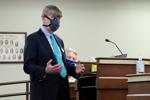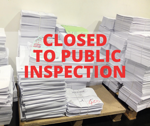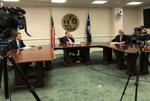The DHEC board’s welcomed vote last week to recommend mask requirements in South Carolina's public schools was as significant as it was surprising.
Significant because most of the board members were appointed by Gov. Henry McMaster, who so adamantly has opposed school mask mandates, and confirmed by state senators, who allowed the law to pass prohibiting those requirements. For both political and legal reasons, the board’s unanimous decision puts more pressure on the Legislature to rewrite the current law and, absent that, actually encourages schools to violate the law, since it means most schools are now out of compliance with the guidelines they must follow to be protected from liability from COVID-related lawsuits.
Surprising because the board of the Department of Health and Environmental Control has never been known to buck the prevailing politics of the governor or the Legislature.
Even more surprising — and significant — is that the board apparently was considering the whether it had the legal authority to invoke DHEC’s emergency health powers to enact a statewide school mask requirement itself. A spokesman confirmed that the board received legal advice “to evaluate the applicability of those powers given the current situation.”
We have no idea how serious board members were about that option, or precisely what their lawyer told them about whether it was an option, because the legal advice was delivered during a 42-minute closed-door session, after which the board gave no hint about what was discussed. Once back in open session, it spent just two minutes approving a motion to direct DHEC Director Dr. Edward Simmer to amend his agency’s guidelines for schools to recommend mask requirements and to direct Dr. Simmer and Chairman Mark Elam to ask the Legislature to amend the law that prohibits such requirements.
As encouraged as we are by the board’s commitment to protecting the public health instead of bowing to an anti-public health political agenda, we are concerned by its secret session.
The state’s open meetings law has such a broad exemption for legal advice — it includes any discussion “covered by the attorney-client privilege,” which any competent lawyer can argue includes saying “hello” to a client — that it probably was legal to kick the public out. But it certainly violated the spirit of the Freedom of Information Act, which the Legislature passed to ensure that the public knows not only what our government is doing but also why.
Except in extraordinary cases, where the mere discussion could tip people off to information that urgently needs to be kept private, we don’t see how it's appropriate for a board to meet in executive session to receive a legal briefing about what the law does and doesn’t allow it to do. That’s the very definition of information the public has a right to know.
In this bizarre moment, when a number of elected officials are determined to limit what government can do to fight a pandemic, the primary public policy question often isn’t whether a given action is a good idea. It’s whether the action is legal and, if not, whether officials want to violate the law. That needs to be a public discussion.
DHEC certainly isn’t alone in hiding behind closed doors to discuss COVID-19 matters that ought to be discussed in public. Only a few days earlier, both the Charleston County and Richland 1 school boards shut out the public to receive legal advice before voting to require masks in school, in violation of state law. The Richland 2 board did the same but ended up only directing district staff to explore legal options.
The Charleston County board compounded its problem by also receiving what it described as medical advice in the secret session — which state law doesn’t even hint at allowing. Of course, maybe we shouldn’t expect better since the board members took their vote without even mentioning the conflict with state law.
That decision soon came back to haunt the board; days later, the chairman announced to confused parents and teachers that no one would be denied entrance to the schools for refusing to wear a mask. That means the mandate isn’t really a mandate, and therefore might or might not violate state law — all of which might have been clear had the “legal advice” been discussed in public.
DHEC’s closed-door COVID meeting, by contrast, came nowhere near violating state law. And unlike the Charleston County School Board, DHEC allowed the public to hear the medical advice, which seemed to have been pulled together as much for the public's consumption as the board’s. Its public delivery illustrated why it’s in everyone's interest to hold such briefings in public: Two well-respected physicians discussed numerous studies documenting both the effectiveness and the safety of masks — the very type of information that mask opponents say doesn’t exist. And the presentations — now available on DHEC’s website — include links to those studies for anyone who wants more information.
The problem with these closed-door executive sessions isn’t confined to COVID. It’s just more problematic here, because some of the main public health problems we face are misinformation and a lack of trust in public health officials. Beatrice King was the only member of the four boards who objected to receiving legal advice about COVID rules in a secret session. As she argued before the Richland 1 board voted to kick out the public: "This needs to be a really, really transparent and open discussion so that the public knows exactly what we’re facing."
"occur" - Google News
August 26, 2021 at 05:30AM
https://ift.tt/3gxEW2a
Editorial: SC COVID debates need to occur in public, even when lawyers are involved - Charleston Post Courier
"occur" - Google News
https://ift.tt/2UoDqVw
https://ift.tt/2Wq6qvt
Bagikan Berita Ini





















0 Response to "Editorial: SC COVID debates need to occur in public, even when lawyers are involved - Charleston Post Courier"
Post a Comment